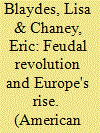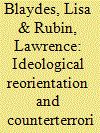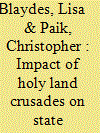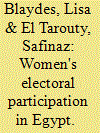|
|
|
Sort Order |
|
|
|
Items / Page
|
|
|
|
|
|
|
| Srl | Item |
| 1 |
ID:
109573


|
|
|
|
|
| Publication |
2011.
|
| Summary/Abstract |
How does regime type affect the poor? Are certain types of regimes better at translating economic growth into consumption for the world's least privileged citizens? We propose an alternative measure of transfers to the poor that is nearly universally available and innately captures distribution: average daily calorie consumption. In sharp contrast to the consumption of material goods or the accumulation of wealth for which humans have shown no upper bound on their ability to achieve, biological limits make it impossible for a small number of individuals to consume most of a nation's calories. Democracies and hybrid regimes-which combine elements of autocracy and democracy-are better at translating economic growth into total calorie consumption than autocracies and perform strikingly similarly in this regard; democracies outperform both hybrid regimes and autocracies, however, in converting growth into higher quality calories from animal sources.
|
|
|
|
|
|
|
|
|
|
|
|
|
|
|
|
| 2 |
ID:
113551


|
|
|
|
|
| Publication |
2012.
|
| Summary/Abstract |
The battle for public opinion in the Islamic world is an ongoing priority for U.S. diplomacy. The current debate over why many Muslims hold anti-American views revolves around whether they dislike fundamental aspects of American culture and government, or what Americans do in international affairs. We argue, instead, that Muslim anti-Americanism is predominantly a domestic, elite-led phenomenon that intensifies when there is greater competition between Islamist and secular-nationalist political factions within a country. Although more observant Muslims tend to be more anti-American, paradoxically the most anti-American countries are those in which Muslim populations are less religious overall, and thus more divided on the religious-secular issue dimension. We provide case study evidence consistent with this explanation, as well as a multilevel statistical analysis of public opinion data from nearly 13,000 Muslim respondents in 21 countries.
|
|
|
|
|
|
|
|
|
|
|
|
|
|
|
|
| 3 |
ID:
121088


|
|
|
|
|
| Publication |
2013.
|
| Summary/Abstract |
We document a divergence in the duration of rule for monarchs in Western Europe and the Islamic world beginning in the medieval period. While leadership tenures in the two regions were similar in the 8th century, Christian kings became increasingly long lived compared to Muslim sultans. We argue that forms of executive constraint that emerged under feudal institutions in Western Europe were associated with increased political stability and find empirical support for this argument. While feudal institutions served as the basis for military recruitment by European monarchs, Muslim sultans relied on mamlukism-or the use of military slaves imported from non-Muslim lands. Dependence on mamluk armies limited the bargaining strength of local notables vis-à-vis the sultan, hindering the development of a productively adversarial relationship between ruler and local elites. We argue that Muslim societies' reliance on mamluks, rather than local elites, as the basis for military leadership, may explain why the Glorious Revolution occurred in England, not Egypt.
|
|
|
|
|
|
|
|
|
|
|
|
|
|
|
|
| 4 |
ID:
083811


|
|
|
|
|
| Publication |
2008.
|
| Summary/Abstract |
During the 1990s, Egypt fought a bitter campaign against militant Islamist groups in which over a thousand people died. Since the end of the insurgency in 1997, Egypt's two fiercest Islamic terrorist groups, first the Islamic Group (Al-Gama'a Al-Islamiyya) and then Islamic Jihad, not only ceased their violent activities but also produced and published texts revising their religious beliefs on the use of violence. Based on the counterterrorism experience of Egypt, this paper defines and describes a counterterrorism strategy of ideological reorientation. We define ideological reorientation as a counterterrorism approach that seeks to change core ideological or religious beliefs of the terrorist group, thus bringing the beliefs of group members in line with societal norms. While we cannot causally attribute the groups' decisions to lay down arms to ideological reorientation versus other regime actions (like repression), the Egyptian experience is highly suggestive. First, it indicates that the ideology of religiously-based groups is not exogenous and fixed, as is often assumed, but rather endogenous and flexible. Second, the Egyptian experience suggests that ideological reorientation may be more effective at stemming militancy in the long run compared to rival approaches.
|
|
|
|
|
|
|
|
|
|
|
|
|
|
|
|
| 5 |
ID:
147550


|
|
|
|
|
| Summary/Abstract |
Holy Land Crusades were among the most significant forms of military mobilization to occur during the medieval period. Crusader mobilization had important implications for European state formation. We find that areas with large numbers of Holy Land crusaders witnessed increased political stability and institutional development as well as greater urbanization associated with rising trade and capital accumulation, even after taking into account underlying levels of religiosity and economic development. Our findings contribute to a scholarly debate regarding when the essential elements of the modern state first began to appear. Although our causal mechanisms—which focus on the importance of war preparation and urban capital accumulation—resemble those emphasized by previous research, we date the point of critical transition to statehood centuries earlier, in line with scholars who emphasize the medieval origins of the modern state. We also point to one avenue by which the rise of Muslim military and political power may have affected European institutional development.
|
|
|
|
|
|
|
|
|
|
|
|
|
|
|
|
| 6 |
ID:
083781


|
|
|
|
|
| Publication |
2008.
|
| Summary/Abstract |
Why do some Muslim women adopt fundamentalist Islamic value systems that promote gender-based inequalities while others do not? This article considers the economic determinants of fundamentalist beliefs in the Muslim world, as women look to either marriage or employment to achieve financial security. Using cross-national public opinion data from eighteen countries with significant Muslim populations, the authors apply a latent class model to characterize respondents according to their views on gender norms, political Islam, and personal religiosity. Among women, lack of economic opportunity is a stronger predictor of fundamentalist belief systems than socioeconomic class. Cross-nationally, fundamentalism among women is most prevalent in poor countries and in those with a large male-female wage gap. These findings have important implications for the promotion of women's rights, the rise of political Islam, and the development of democracy in the Muslim world.
|
|
|
|
|
|
|
|
|
|
|
|
|
|
|
|
| 7 |
ID:
053439


|
|
|
| 8 |
ID:
096858


|
|
|
|
|
| Publication |
2010.
|
| Summary/Abstract |
Why are some peace processes accompanied by bloody political violence while others are not? Recent scholarship suggests that when factions fear that they will not benefit or will be excluded from a negotiated settlement these groups may protect their interests by sabotaging the peace process through violent tactics. We compare three peace processes in Africa - the negotiations to end armed struggles in Mali, the Western Sahara and Sudan - to investigate why spoilers arise in some contexts and not others. We argue that peace process exclusivity, that is negotiations between only some of the potential parties to a conflict, is more likely to breed violence than inclusive peace negotiations where all relevant groups have a seat at the bargaining table. A key to our argument is that the number and form of combatant groups is endogenous to peace process negotiations; as a result, exclusivity encompasses not just leaving out warring parties but also the exclusion of groups that might object to the terms of the peace should they be left out of the bargaining process. This is particularly important since many peace agreements include provisions regarding the distribution of government services, jobs, and representation that may indirectly impact the availability of those goods for other stakeholders, particularly non-combatant parties. While inclusive agreements may be harder to reach, our findings suggest that international organisations that participate in peace negotiations need to carefully consider the real-world trade-off between the ability to reach an agreement and the sustainability of that agreement over time.
|
|
|
|
|
|
|
|
|
|
|
|
|
|
|
|
| 9 |
ID:
089638


|
|
|
|
|
| Publication |
2009.
|
| Summary/Abstract |
To what extent do gender considerations impact voter recruitment strategies in Middle Eastern elections? Based on an examination of voting behavior in Egypt, we find that clientelist voter recruitment tends to empower women economically rather than politically as elections provide an opportunity for disadvantaged women to sell their vote to local vote brokers or offer their vote to a local patron in exchange for a future payoff. In contrast, women who vote for Islamist candidates may be able to increase the influence of their political support by creating common knowledge about the popularity of their candidate and by reducing the effectiveness of government repression.
|
|
|
|
|
|
|
|
|
|
|
|
|
|
|
|
|
|
|
|
|